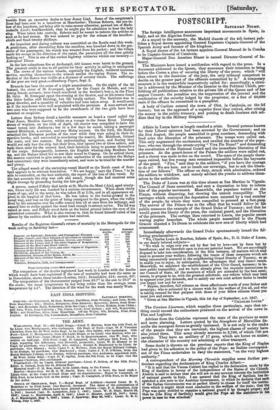The Duke of Lucca was at this time absent at
San Martino in Vignale- The Council of State assembled, and sent a deputation to him to inform him of the popular movement. Meanwhile, the populace waited on the Piazza, without dispersing, but showing the utmost tranquillity. The carriages which conveyed the deputation were escorted by a vast number of the people; by whom they were compelled to proceed at a foot-pace, The answer of the Prince was to the effect that he -would follow in his public measures the example of the Grand Duke of Tuscany; and that he would grant the liberty of the press, the national guard, and the liberation of the prisoners. The cortege then returned to Lucca, the popular escort waving poplar branches. The whole people assembled in the Piazza Grande chanted a Te Deum to celebrate the new rem of liberty which had commenced.
Immediately afterwards the Grand Duke spontaneously issued the fol- lowing proclamation-
" We, Charles Louis de Bourbon, Infante of Spain, &c., D. G. Duke of Lucca, to our dearly beloved subjects- " We wish to reign over you not by fear but by love—not by force but by beneficence; and we therefore open to you our paternal heart. We are accordingly disposed to take into consideration, in the first instance, all matters which may tend to promote your welfare; following the traces of those measures which are being suecPssively matured in the neighbouring Grand Dutchy of Tuscany, so as. to enable you to enjoy, by anticipation, the advantages that may thence result. Meanwhile, we announce the establishment of the Civic Guard, necessary to in- sure public tranquillity, and we have already given the requisite instructions to our Council of State, all the members of which are animated by the best senti- ments, to propose to us, with the greatest solicitude, any reform which may tend to appease year just demands, and to satisfy our own most ardent desire to render you happy now and for ever. " Repose therefore, full reliance on these affectionate words of your father and. sovereign; who is animated by a sincere wish for the welfare of you all, and who is taking counsel for that purpose with those of your fellow citizens whom you most love and esteem.
"Given at San Martino in Vignale, this 1st day of September, A.D. 1847. " CHARLES Loots."
The Corriere Livornese, which supplies these particulars, says that no- thing could exceed the enthusiasm produced on the arrival of the news in Pisa and Leghorn.
Advices from the Calabrias represent the state of the province as more and more alarming. Letters quoted by the Semaphore of Marseilles de- scribe the insurgent forces as greatly increased. It is not only in the ranks of the people that they are recruited; the highest classes of society have also joined them. This army already amounts to 2,700, of which 700 are cavalry. They have an artillery of 17 guns, which are borne on mules; the character of the country not admitting of other transport.
Some doubt is thrown on the previous reports that the King of Naples had given in his adhesion to the policy of the Pope: an Italian correspond- ent of the Times undertakes to deny the statement, "on the very highest authority." A correspondent of the Morning Chronicle supplies some further par- ticulars regarding the declarations of King Charles Albert-
" It it said that the Vienna Cabinet has replied to the declaration made by the Bing of Sardinia in favour of the independence of the States of the Chunk Austria is said to declare that she will not on any account tolerate the institution of national guards in Italy. I am assured that the King of Sardinia has de- spatched a new note to the Austrian Government, in which he declares that each of the Italian Governments was at perfect liberty to choose for itself the instate- Sons which it might think most conducive to the welfare of the state; that the Pope was quite entitled to organize a national guard if he thought proper; and that he (the King of Sardinia) would give the Pope all the assistance in ha power in cue he was attacked."


























 Previous page
Previous page